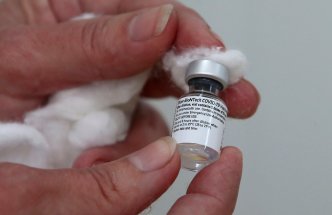Building strength in vaccination lull before long run
Read this article for free:
or
Already have an account? Log in here »
To continue reading, please subscribe:
Monthly Digital Subscription
$0 for the first 4 weeks*
- Enjoy unlimited reading on winnipegfreepress.com
- Read the E-Edition, our digital replica newspaper
- Access News Break, our award-winning app
- Play interactive puzzles
*No charge for 4 weeks then price increases to the regular rate of $19.00 plus GST every four weeks. Offer available to new and qualified returning subscribers only. Cancel any time.
Monthly Digital Subscription
$4.75/week*
- Enjoy unlimited reading on winnipegfreepress.com
- Read the E-Edition, our digital replica newspaper
- Access News Break, our award-winning app
- Play interactive puzzles
*Billed as $19 plus GST every four weeks. Cancel any time.
To continue reading, please subscribe:
Add Free Press access to your Brandon Sun subscription for only an additional
$1 for the first 4 weeks*
*Your next subscription payment will increase by $1.00 and you will be charged $16.99 plus GST for four weeks. After four weeks, your payment will increase to $23.99 plus GST every four weeks.
Read unlimited articles for free today:
or
Already have an account? Log in here »
Hey there, time traveller!
This article was published 17/02/2021 (1759 days ago), so information in it may no longer be current.
Six months from now, when (theoretically, at least) most of the country is immunized against COVID-19, we may look back at the three-week lull in vaccinations as a blessing.
Starting the week of Jan. 25, Canada’s principal supplier of vaccines, Pfizer, suspended shipments while one of its principal factories in Belgium was being retrofitted to expand capacity. The shortage of Pfizer-BioNTech doses — the first and most widely approved COVID-19 vaccine — crippled programs in many countries.
Pfizer has promised it will catch up on its orders, and provide the gross majority of expected shipments to Canada by the end of March. The supply shortage has been a particularly cruel development in an intolerably long pandemic battle.

However, while no one wanted interruption in the COVID-19 vaccine rollout, the three-week lull appears to have provided an opportunity for Manitoba’s implementation task force to check off an impressive list of items from its to-do list.
In the last three weeks, Manitoba expanded the number of professions eligible to administer vaccines, which should go a long way to creating a pool of qualified contingent staff to cover any unforeseen shortages at its inoculation “super-sites.”
The task force also struck a deal with medical clinics and pharmacies to deliver shots, offering them training materials to ensure any new vaccines (other Pfizer and Moderna) are properly handled and administered.
The province has said repeatedly it wants to establish at least one major immunization site in every regional health authority. It took another step towards that goal with the opening of super sites in Selkirk and Morden/Winkler.
In February, an immunization site was opened in Winnipeg for First Nations health-care workers, traditional healers and knowledge keepers.
Johanu Botha, co-lead of the vaccine implementation task force, said detailed planning on all of these initiatives started long before the disruption in supply. However, he acknowledged the wrinkle created an opportunity to bring improvements and enhancements to fruition.
“It might be tempting for any large endeavour to take things slower during a lull,” said Botha. “But we absolutely did not do this here. We powered ahead without breaking stride.”
That is good news, and strongly suggests the missteps of the first month of the rollout may not be repeated. Manitoba, like many jurisdictions, stumbled out of the gate in late December and into early January, as it tried to put distribution systems in place.
Some of the problems were the result of the finicky nature of the vaccines themselves. In particular, Pfizer advised the provinces its product could only be administered at immunization super-sites because of the need for super-cold storage and precise timelines for use after thawing.
A shortage of people qualified to administer such shots also slowed the pace of immunizations at the RBC Winnipeg Convention Centre site profoundly, and some with appointments did not get their scheduled shots.
Staff shortages, some due to illness, in part caused Manitoba to halt vaccinations for six days over Christmas.
In terms of booking appointments, the province’s call centre turned out to be a logistical nightmare. Health-care professionals who were among first eligible reported being on hold for hours. On at least two occasions, email notifications managed by a third-party company directed health-care workers to the wrong location for their shots.
In many ways, these problems were not surprising or unique. This is the biggest and most challenging global vaccine distribution challenge ever seen. Just about every jurisdiction has struggled.
However, let’s not forget governments around the world, including Manitoba, ignored decades of warnings about the need to develop systems and protocols for managing a pandemic — including a detailed plan for the administration of huge quantities of vaccine.
Since the novel coronavirus began its relentless march around the globe in early January 2020, every government in every country has been playing catch-up.
In the end, it matters less whether Manitobans get vaccinated in February, and more that as many people as possible are vaccinated before the onset of warmer weather in the spring, which will no doubt aggravate the collective need to interact with other human beings.
The delay in supply has revealed a number of structural issues that have left countries such as Canada at the mercy of an opaque global vaccine industry. Thankfully, Manitoba’s task force is demonstrating a much-needed skill in a crisis.
It is facing up to its stumbles and learning from its mistakes. Given the amount of work it got done in just three weeks, it’s learned to do it quickly.
dan.lett@freepress.mb.ca

Born and raised in and around Toronto, Dan Lett came to Winnipeg in 1986, less than a year out of journalism school with a lifelong dream to be a newspaper reporter.
Our newsroom depends on a growing audience of readers to power our journalism. If you are not a paid reader, please consider becoming a subscriber.
Our newsroom depends on its audience of readers to power our journalism. Thank you for your support.
History
Updated on Wednesday, February 17, 2021 9:26 PM CST: Fixes several typos.
Updated on Wednesday, February 17, 2021 9:50 PM CST: Fixes typo.






